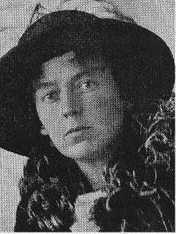Gerda Planting-Gyllenbåga facts for kids
Gerda Planting-Gyllenbåga (1878–1950) was an important Swedish woman who worked hard for women's rights. She was a suffragist, meaning she fought for women to get the right to vote. Gerda was also an expert in social welfare, which means helping people in need. She was very active in the women's movement across Sweden. Gerda helped organize courses to teach women and make them more aware of their rights. In 1911, she worked with the Swedish Association for Women's Suffrage (LKPR) to create country-wide education programs. These programs were paid for by Martina Bergman-Österberg. Later, in 1916, Gerda moved to Stockholm to lead CSA, a Swedish group focused on social welfare.
Contents
Early Life and Education
Gerda Henrietta Margareta Planting-Gyllenbåga was born in 1878 in a small village called Istrum, near Skara in western Sweden. Her father, Claes Gustaf August Planting-Gyllenbåga, was an army officer. Her mother was Louise Vilhelmina Freundt. Gerda was the youngest of seven children. She grew up in a wealthy family and received a good education.
Fighting for Women's Rights
After finishing her studies in Stockholm, Gerda moved back to the Skaraborg area. She settled in Rogberga, near Huskvarna, where she worked to help factory workers. Gerda was a strong leader in the movement for women's right to vote. She started a local branch of the LKPR in Rogberga. She also became a member of the national LKPR board. In 1917, she was even considered to lead the whole organization. Gerda also attended several international meetings for women's suffrage as a delegate for the LKPR. These meetings were organized by the International Women Suffrage Alliance.
Success in Rogberga
Gerda was very good at building up the Rogberga suffrage society. It became a very strong local group. In 1913, they were even able to open their own meeting place. Important national leaders of the suffrage movement often came to speak there. These speakers included Augusta Tonning, Lydia Wahlström, Frigga Carlberg, Gulli Petrini, and Kerstin Hesselgren. In June 1915, Rogberga hosted the LKPR's third big national meeting in Huskvarna.
Promoting Education for Women
From 1911, Gerda Planting-Gyllenbåga played a key role in organizing educational courses across Sweden. These courses were funded by Martina Bergman-Österberg. Their goal was to help the LKPR teach Swedish women more about society. This encouraged women to join the fight for their right to vote. In 1912, Gerda became the first person to lecture as part of these courses.
In 1915, she moved back to Stockholm to become the director of the CSA, the social welfare association. She stayed in this role until 1918. That year, she married Andreas Adolf Fredrik Lindblom, who was an art historian. They did not have any children.
Gerda Planting-Gyllenbåga passed away in Stockholm on May 17, 1950, at the age of 71. She was buried in Tyresö Cemetery.
 | Victor J. Glover |
 | Yvonne Cagle |
 | Jeanette Epps |
 | Bernard A. Harris Jr. |


